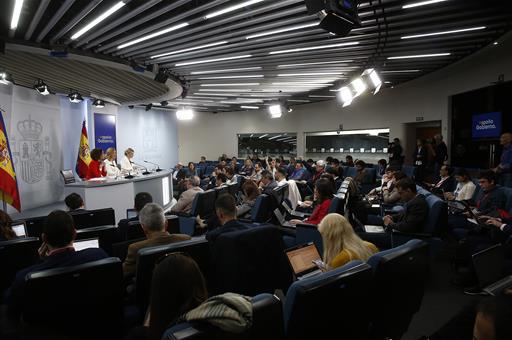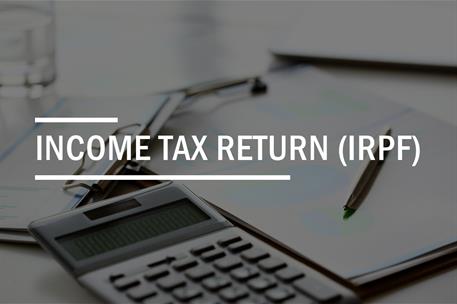The Government of Spain approves the increase of the Minimum Wage to 1,134 euros in 14 payments
Council of Ministers - 2024.2.6
Moncloa Palace, Madrid
The Council of Ministers has approved the increase of the Minimum Wage (SMI) for 2024 to 1,134 euros in 14 payments, following the agreement reached with the trade unions Comisiones Obreras (CCOO) and Unión General de Trabajadores (UGT). The increase will be backdated to 1 January 2024 and an estimated 2.5 million workers will benefit from this measure.
The Minister for Education, Vocational Training and Sports and Government Spokesperson, Pilar Alegría, has highlighted that the Minimum Wage has increased 54% since 2018. "Then it was 735 euros per month and today it is 1,134 euros per month, a rise that will improve the quality of life of workers, especially women workers in our country".
In the same vein, the Second Vice-President of the Government of Spain and Minister for Work and Social Economy, Yolanda Díaz, remarked that there has been a systematic revaluation of the Minimum Wage, which today represents 398 euros per month and 5,573 euros per year: "There is still a long way to go and we are still far from European averages, but inequality is being reduced and Spain is a better country today. "It is a giant step forwards in a country with moderate wage incomes," she added.
On the other hand, Díaz pointed out that the gap between Spain's wage income and the European Union average is 19 points, which is why it is necessary to continue to increase all wages, not just the minimum wage.
In the opinion of the second vice-president, the best tool for combating wage poverty and inequality is the Minimum Salary, which is "a feminist tool par excellence", which has enabled Spain to reduce the pay gap by 25 points compared to what it was before the pandemic.
Yolanda Díaz also referred to the pay gap between managers and employees. "We have a humble average salary of 1,545 euros gross per month, which needs to be improved". A director of an Ibex-listed company earns 54 times more and some directors of financial institutions earn up to 200 times more, she pointed out.
In addition, the second vice-president advocated a reduction in working hours without a reduction in pay.
Transparent and predictable working conditions
 The Second Vice-President and Minister for Work and Social Economy, Yolanda Díaz, during her speech at the press conference after the Council of Ministers | Pool Moncloa / José Manuel Álvarez
The Second Vice-President and Minister for Work and Social Economy, Yolanda Díaz, during her speech at the press conference after the Council of Ministers | Pool Moncloa / José Manuel Álvarez
The Council of Ministers also agreed to transpose a European directive on transparent and predictable working conditions, which is a further step in the fight against job insecurity, especially for women.
The Minister for Work underlined that the regulation prohibits on-call work and zero-hour contracts, so that workers will not have to be permanently available to employers.
The rule requires the company to strictly record all the conditions of the employment relationship in writing, such as the duration of the contract, the type of working day and the distribution of hours, the records, the salary and the length of the probationary period.
"I believe that many women workers in the distribution and service sectors will be happy today, as it will not be possible to amend working hours in part-time contracts as a mechanism to lower their wages", stressed Yolanda Díaz.
The directive also states that collective bargaining cannot worsen the working conditions of employees. And companies may not prohibit their employees from moonlighting.
The second vice-president has advanced that the violation of any of the transposed rules will lead to the transformation of the contracts into full-time permanent contracts.
Reduction of personal income tax withholdings
 The First Vice-President of the Government of Spain and Minister for Treasury, María Jesús Montero, during her speech at the press conference after the Council of Ministers | Pool Moncloa / José Manuel Álvarez
The First Vice-President of the Government of Spain and Minister for Treasury, María Jesús Montero, during her speech at the press conference after the Council of Ministers | Pool Moncloa / José Manuel Álvarez
The Council of Ministers has amended the Personal Income Tax (IRPF) Regulations to bring withholdings into line with the increase in the Minimum Wage approved today. The amendment means that workers paid up to this threshold will be exempt from personal income tax deductions in their salaries. If last year the minimum amount was raised from 14,000 to 15,000 euros, this time it rises to 15,876 euros, the equivalent of the annual Minimum Wage.
The First Vice-President of the Government of Spain and Minister for Treasury, María Jesús Montero, has framed this measure within the Executive's policies to improve the quality of employment and protect workers' incomes. She also linked it to the "good evolution" of the Spanish economy, which is the fastest growing among the large countries of the European Union.
Montero stressed that the growth of Spain's Gross Domestic Product (GDP) in 2023 - 2.5% - has exceeded all forecasts, including those of the Government, and that, "far from slowing down, the Spanish economy accelerated in the last quarter of the year", with growth of 0.6%, double that of Germany. She also highlighted that household income is already 6% above pre-pandemic levels, household debt has been reduced to its lowest level since 2002 and Spain is below average in terms of tax burden.
The first vice-president clarified that the personal income tax amendment, which requires the status of law, will be included in the draft of the General State Budget for 2024. What the Government has approved today is the amendment of the Regulation so that these workers will no longer be subject to withholdings that would reduce their monthly income and which the Treasury would return to them next year.
Greater tax justice
As personal income tax is a progressive tax, raising the minimum from which withholding tax is levied benefits other low and medium income earners, both wage earners and pensioners. Specifically, 5.2 million taxpayers with incomes below 22,000 euros will save a total of 1.385 billion euros in 2024 thanks to this measure. For example, a person with a salary of 18,500 euros, the most common salary in Spain, will pay 1,128 euros in personal income tax withholdings compared to 1,328 euros last year.
On the contrary, Montero stressed, the government is demanding a greater effort "from those who have the most": it has increased the taxation of capital income above 200,000 euros, it has approved taxes on large fortunes and on the extraordinary profits of banks and energy companies, and it has established a minimum of 15% in corporation tax for multinationals. "Without tax justice there is no social justice," she said.
Additional 0.5% increase for public employees
The Executive has approved a 0.5% pay rise for all public administration employees. The first vice-president recalled that this increase was already included in the General State Budget for 2023, as part of the Agreement for a 21st Century Administration signed with the trade union organisations.
The increase was conditional on economic performance, namely nominal GDP in 2023 exceeding 6%. According to data from the National Statistics Institute (INE), this indicator grew by 8.6%. "The economy is doing well and, therefore, so are the salaries of our public employees in this economic situation", said María Jesús Montero.
The treasury minister pointed out that last year the government also paid the 0.5% increase in salaries linked to inflation, "so that with this we are fulfilling all the commitments for 2023 that were signed with the social partners".
The agreed wage increase for this year is 2%, with the possibility of a further 0.5% increase linked to the evolution of prices. In total, between 2022 and 2024 the increase could reach 9.5%. "This is what motivates us, and this is how we will continue to work throughout the legislature, accompanying citizens in their welfare and particularly public employees, who are the talent and excellence that we have to look after in the public administration as a whole, both in general and in the territorial administrations," Montero said.
The Government's Commitment to the primary sector
 The Minister for Education, Vocational Training and Sports and Government Spokesperson, Pilar Alegría, during her speech at the press conference after the Council of Ministers | Pool Moncloa / José Manuel Álvarez
The Minister for Education, Vocational Training and Sports and Government Spokesperson, Pilar Alegría, during her speech at the press conference after the Council of Ministers | Pool Moncloa / José Manuel Álvarez
During her appearance at the press conference following the Council of Ministers, the spokesperson expressed the Executive's commitment to farmers, livestock breeders and fishermen and women: "We will always be protecting, accompanying and supporting them".
In this sense, Pilar Alegría said that the Ministry of Agriculture, Fisheries and Food has today published the list of the 140,000 farmers benefiting from the extraordinary aid to alleviate the effects of drought, which has been allocated almost 270 million euros.
Non official translation







